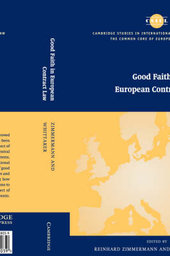
|
Good Faith in European Contract Law
Paperback / softback
Main Details
| Title |
Good Faith in European Contract Law
|
| Authors and Contributors |
Edited by Reinhard Zimmermann
|
|
Edited by Simon Whittaker
|
| Series | The Common Core of European Private Law |
|---|
| Physical Properties |
| Format:Paperback / softback | | Pages:756 | | Dimensions(mm): Height 229,Width 152 |
|
| ISBN/Barcode |
9780521088039
|
| Classifications | Dewey:346.402 |
|---|
| Audience | | Professional & Vocational | |
|---|
| Illustrations |
1 Tables, unspecified
|
|
Publishing Details |
| Publisher |
Cambridge University Press
|
| Imprint |
Cambridge University Press
|
| Publication Date |
11 December 2008 |
| Publication Country |
United Kingdom
|
Description
For some Western European legal systems the principle of good faith has proved central to the development of their law of contracts, while in others it has been marginalized or even rejected. This book starts by surveying the use or neglect of good faith in these legal systems and explaining its historical origins. The central part of the book takes thirty situations which would, in some legal systems, attract the application of good faith, analyses them according to fifteen national legal systems and assesses the practical significance of both the principle of good faith and its relationship to other contractual and non-contractual doctrines and forms of regulation in each situation. The book concludes by explaining how European lawyers, whether from a civil or common law background, may need to come to terms with the principle of good faith. This was the first completed project of The Common Core of European Private Law launched at the University of Trento.
ReviewsFrom the hardback review: 'It is impossible within the span of a short review to do full justice to the quantity of information amassed in Good Faith in European Contract Law. The project was well-conceived, the data is well-presented and the analysis, which seems comfortingly agnostic about the merits of general good faith provisions, is balanced and shrewd. This book sets a high standard for future volumes in the 'Common Core' project to emulate as well as providing scholars and teachers of comparative law with a fund of instructive materials.' Roderick Munday, The Cambridge Law Journal From the hardback review: 'It was at a meeting held at the University of Trento in June 1994 that Reinhard Zimmerman suggested that good faith in contracts might make an interesting and fruitful topic for the so-called Common Core of European Private Law project. Six years later, with the publication of good faith in European Contract law, Zimmermann's suggestion has been brought through to a successful completion. Whether one's interest is in comparative law or its methodology, the harmonisation of European private law, or good faith in contracts, the publication of this book is a major event and, whatever one makes of the product of this study, there is no question that Zimmerman, his co-editor Simon Whittaker, and the team of contributors are to be congratulated for conceiving of such a book and then delivering it so impressively. The book is a mine of informed analysis. Readers who want an introduction to good faith doctrines in German, French and (in its limited way) English contract law, will be considerably assisted by the co-editors' own opening contribution to the book. Similarly, if one's interest in good faith relates to its place in Roman law, or in contract law ion the medieval ius commune, or in US contract law, then the contributions by, respectively Martin Joseph Schermaier, James Gordley, and Robert Summers will be required reading. However, the centrepiece of this book - its distinctive contribution to comparative private law scholarship in general and to an understanding of good faith doctrines (or their cognates) in particular - is the set of 30 case studies, discussion of which takes up the greater part of this volume. The purpose of this study, focused on the 30 hypothetical cases, is not so much to compare doctrinal technique and resource in contract law regimes across Europe; rather, the project is designed to reach beyond surface doctrinal difference to see how far there is a core of agreement as to good faith outcomes in Europe.' Modern Law From the hardback review: '... the book ... reasserts the classic comparative law notion of the functional unity of law.' The Edinburgh Law Review
|